Click on images to enlarge

habit (Photo: Sheldon Navie)
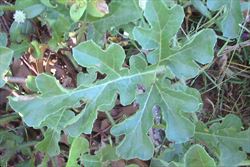
deeply-lobed leaf with almost hairless upper surface (Photo: Sheldon Navie)

hairy stem, tendrils, young leaves and flower (Photo: Sheldon Navie)
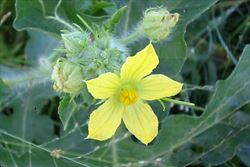
close-up of flower (Photo: Sheldon Navie)
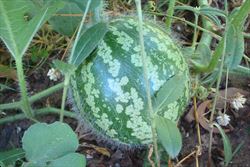
young fruit (Photo: Sheldon Navie)
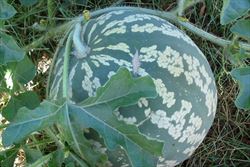
immature fruit (Photo: Sheldon Navie)

close-up of seeds (Photo: Carole Ritchie at USDA PLANTS Database)
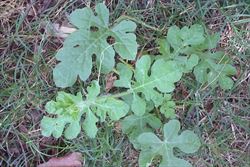
young plant (Photo: Sheldon Navie)
Scientific Name
Citrullus lanatus (Thunb.) Matsum. & Nakai var. lanatus
Synonyms
Citrullus lanatus (Thunb.) Matsum. & NakaiCitrullus vulgaris Schrad.Colocynthis citrullus (L.) Kuntze nom. illeg.Cucurbita citrullus L.Momordica lanata Thunb.
Family
Cucurbitaceae
Common Names
Afghan melon, bastard melon, bitter apple, bitter melon, camel melon, colocynth, kaffir melon, mickey melon, paddy melon, paddymelon, pie melon, watermelon, white watermelon, wild melon, wild watermelon
Origin
The exact origin of this species is uncertain, but it is thought to be native to large parts of Africa and Asia.
Naturalised Distribution
A very widespread species that is naturalised throughout most of Australia, and is particularly common in semi-arid regions. It is widely naturalised in Queensland, New South Wales, South Australia, Western Australia, and the Northern Territory. Also naturalised in ACT and the northern and north-western parts of Victoria.
Notes
Wild melon (Citrullus lanatus var. lanatus) is commonly a weed of pastures and agricultural areas, but also grows on floodplains, along river banks, in the centres of dry lakes, in drainage areas, and in disturbed sandy sites. It is currently regarded as a priority environmental weed in one Natural Resource Management region.
The common edible watermelon is a cultivated variant of this species, but it is not widely naturalised or particularly weedy in Australia.

